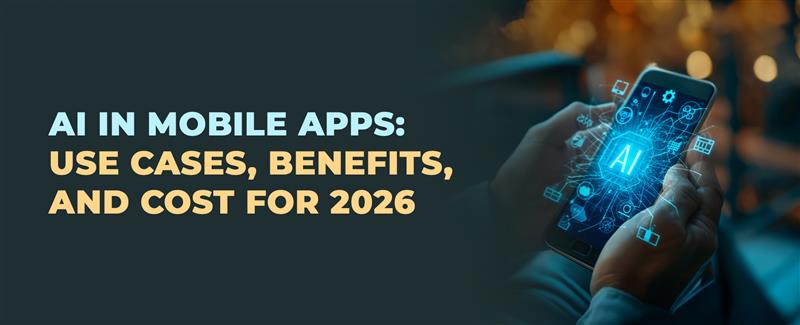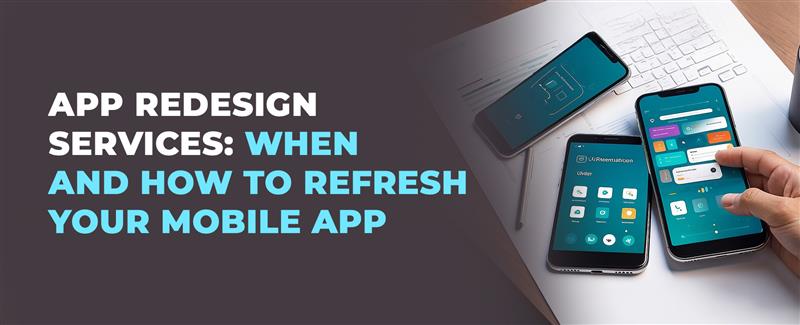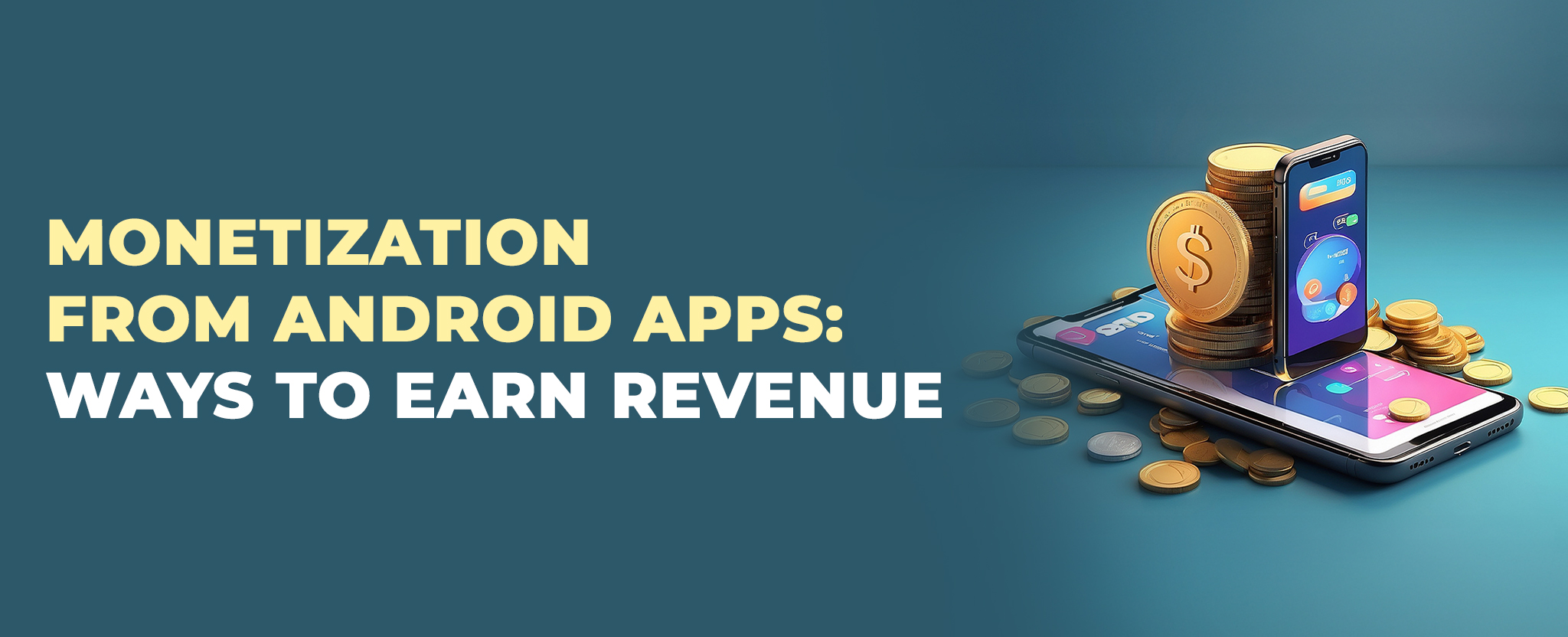Mobile App Development: Best Practices in 2024
7 Jun 22 


The mobile app development industry is always changing. Mobile app development trends are influenced by a variety of reasons, including technological improvements, the user desires, and a variety of other considerations. Staying up to date is, without a doubt, the most important part of success in this field. If creating your own business app seems like a pipedream to you, you’re here at the right place. This list of mobile app development best practices in this blog will help you get over the starting humps of your vision and progress ahead to implementation.
Let’s get started with an important question.
Why Mobile App Development Important In 2023?
Millions of smartphone users across the world now have access to a wide range of applications. These users spend a significant amount of time on these apps and engage in routine activities. Moreover, commercial tasks are completed via mobile apps on a large scale. As a result, a company can continue to flourish with the help of these apps. Therefore, these apps have transformed how we run businesses. Thus, mobile app development is vital for completing commercial tasks.
In this competitive world, apps have made it easier for all businesses to thrive. Adding a feature to improve an app so that it can reach a larger audience is beneficial for increasing revenue. Therefore, the importance of app development has skyrocketed. At the same time, it has made a customer more aware of business information.
In this era, app developers are in high demand to create fantastic mobile apps. These apps are beneficial to use because of their unique qualities. As a result, the role of a mobile app development company in developing a useful app for a business has grown significantly. As a result, a large number of clients can get it for free. The use of mobile app development is essential for the growth of businesses. Thus, every business needs a dedicated mobile application to promote itself online.
There are certain things to know before you develop an app.
Let’s dive into the fundamental principles of mobile app development.
Mobile App Development Fundamental Principles
Given below are a few reliable mobile app development principles that will help you shape your app development process and make required app reductions, additions, and upgrades.
1. Easy App Navigation
The user experience must come first when building customer-centric mobile apps. The smoother it is for a consumer to use your app and get to the app feature they want, the more likely they are to spend time on the app and explore other services. Reduce visual load and extra components that serve no purpose to make navigation more manageable. Make sure you’re using the right navigation structure to create an engaging user experience.
2. Choosing The Right Technology Stack
Choosing the right technology stack for your mobile app that is both complementary and scalable to your business objectives is one of the most significant decisions you will make during the mobile app development process. The app creation process is made easier and more efficient by a number of well-established mobile app development platforms. Application goals, cross-platform vs native app development, industry-specific needs, Compatibility and functionality, technology sponsor, your development team, and Security protocols and integration are some of the primary considerations that can help you shortlist the right technology stack for your mobile app development efforts.
3. Following The ‘Thumb Rule’
User experience design is another foundational principle of mobile apps, where links, key actionable elements, and buttons are placed in reach of the user’s thumb to enable seamless user interactions. Mobile devices are generally used for scrolling the app and interacting with the app elements with the other thumb. Hence, the design of your mobile app should be optimized to facilitate thumb interactions and thumb scrolling.
4. Keeping A User-Focused Design
The whole purpose of developing an app is to offer a solution to a user’s problem. The usability must be at the center of your app development process. Therefore, mobile apps should focus heavily on user engagement and relevance.
5. Removing Unnecessary Data
Navigation and user experience are crucial to the success of the mobile app. The same applies to the data flow. Although mobile devices have restricted processing power, they can’t handle enormous processing requests or handle high loads, and they can’t display exact data. It is important to keep this in mind the UX when developing your mobile app. Also, for processing unrequired information, your mobile app should not consume unnecessary resources.
6. Understanding the unique needs of multiple platforms
As we know, iOS and Android are the two key mobile app development platforms when it comes to development. Whereas there are numerous cross-platform solutions that allow you to design apps for both platforms with a single source code, there are still a lot of considerations and modifications you have to make in your app to meet the needs of multiple platforms. This is particularly significant if you intend to extend your app to another platform.
7. Test, Test, and Test again!
The most important characteristic when it comes to developing a good mobile application development is quality assurance. You must ensure that you undertake rigorous testing for various app functionality and that the software is free of defects. The code should compile devoid of any errors or inconsistencies. To test different components of a mobile app, you’ll need to run a series of tests.
Now, it’s time to get down to business with the most widely used programming languages for mobile app development.
Is there a difference between these app development languages and those used for other types of product design and development? Let’s have a look at them.
The best language for app development, like any other programming language, should contain a set of formal rules for writing application code. There are numerous application languages to pick from nowadays. The technique you choose may be heavily influenced by your business goals, as well as the capabilities of the operating system you select as the platform, the type of application, and its needs.
Many languages used in online development may simply be employed in mobile programming. Not only for developers but also for their customers who want to better understand project processes and know which language to employ for future projects, having an understanding of app languages for producing mobile applications is beneficial.
So, let’s have a look at the main programming languages used for mobile development on iOS and Android here.
Languages Used For Developing A Mobile App
If you’re new to mobile development, picking the correct programming language can be difficult. Don’t be concerned! Some of the common languages used in 2023 are ASP.NET, Objective-C, Python, AJAX, Ruby, Perl, HTML, Java, C, C#, C++, SQL, PHP, Swift, and TypeScript.
Now, let’s dwell on the Best Practices of Mobile App Development
It can be intimidating to create a mobile app, especially if you’ve never done it before. Even if you’ve done something similar before, there are still a lot of aspects to consider. But However, nothing worth doing comes easy. But, with that stated, having a guide or reference to follow makes everything easier. We’ve chosen the top mobile app best practices for you to keep in mind as you go through the development process as an industry expert with experience as a developer.
Through this blog, we will take you through each one of these best practices so you can put yourself in the best position to succeed. Here are the top 8 factors to prioritize.
Best Practices of Mobile App Development
If you are a non-tech business building your first mobile app, or even an experienced mobile app development company working on their next project, understanding and revising the best practices in mobile app development can benefit you greatly in reducing cost, increasing efficiency, and creating a full-stack scalable mobile app solution.
1. Strategy
The first step in the mobile app development process is to design a plan to determine how a mobile app may help your business. You’ll define the app goal and target audience at this step.
2. Competitor Research
Competitive analysis is a nerdy word for discovering and evaluating the strengths and weaknesses of your existing and potential competitors in comparison to your own app or even some of its features. It’s done with the help of some app competitor analysis tools. You can determine whether or not you have a viable app that has the potential to be favorably received by customers based on the findings of our app analysis report. It’s also highly important as a tool for demonstrating your preparation and business acumen to investors in order to gain their financial support.
3. Analysis And Planning
At this point, your app concept begins to take shape and develop into a working product. Prepare a product plan when you’ve defined your app’s requirements. Prioritizing mobile app requirements and combining them into delivery milestones are examples of this.
4. Choose the platform
Do you plump for the native route? Decided? Then, you must choose between iOS and Android as your operating system. To make some development processes easier, you can utilize different software with different uses in each of these OS. It’s not easy to pick a platform because, in reality, even this small step has an algorithm. This crucial mobile app development best practice identifies your target customer at a deeper level. There are variations among the behaviors of Apple and Android users that you may need to connect back to your research.
5. Design A Strategic Plan
At this point, you should create a thorough roadmap for the next steps in your mobile app development. Break the strategy and processes down into smaller, more manageable pieces. Then, determine how much your mobile app is worth to your users. Make a list of the features and functions that are only available in your app. How, and to what extent, could your mobile app fulfill the needs of your consumers, in addition to mobility and flexibility of use?
6. Choosing The Right Technology
It is important to become familiar with the various technologies used in the creation of mobile apps. To analyze the structure and design of every technology stack for mobile application development, consider network scalability, data storage, security, and user experience. This will give you a sense of how each component of your app will work.
7. App testing
Tests are used to keep track of your app’s overall performance. It’s important to note that testing isn’t limited to the time leading up to the deployment of the app. Mobile app development is an ongoing process that necessitates constant testing to identify and correct faults as well as discover last-minute errors.
You can use software designed specifically for testing if you don’t have a large in-house testing crew. You can use TestFlight if you’re making an iOS app. It’s absolutely a free online service to transparently invite customers for beta testing over the air. It’s a free online service that invites consumers to beta test over the air in a transparent manner. Beta Family, on the other hand, is ideal for both Android and iOS app beta testing.
8. Deployment and Support
Based on your key objectives, you will be directed to either Google Play Store or Apple’s App Store for application release. You must follow particular steps to be accepted and acquire confirmation from these services, which are depending on the number of rules and app requirements for each platform. Finally, support and maintenance will be given to ensure that mobile apps have constantly relevant features and flawless performance.
Last but not the least, we will take you to know about app monetization to optimize and generate impressive revenue from your app.
9. Choosing The Right Mobile App Monetization Strategy
App monetization is the process of turning a user base into a revenue stream for publishers and developers. Paid apps, in-app purchases, advertising, and other possibilities are some of the ways that can be used to achieve this. Various factors influence which model is best for your app and overall business goals, but a monetization plan must be established prior to launch.
Your app’s monetization strategy will be determined by your business goals. Here are some considerations to think about while developing a mobile app monetization strategy. At a base level, business owners need to consider what their app does. What problem does it solve? How does it solve this problem? What is the service/purpose? At the most base level, business owners must consider what their app accomplishes. What problem is it supposed to solve?
Competitor research should be prioritized while developing a mobile app. App development and establishing potential monetization strategies necessitates a thorough examination of similar or related apps in the same vertical. Specifically, how are your competitors making money? How effective are their models? Is there a hole in the market that could be filled? Is there anything that might be done differently to increase revenue generation?
User research is another part of product definition that aids in the selection of the best mobile app monetization plan. What are their names? What are they looking for? Most importantly, what, if anything, are they willing to pay for? Generally, users need to be demonstrated value in order to make purchases. Demonstrate value before acquisition for pay-per-download apps; for free downloads, the value proposition must be demonstrated through the app’s experience or utility. Understanding which mobile app monetization strategy is ideal for your app and how to generate revenue in order to maintain long-term growth is only one aspect of the process.
Further, it is vital to know what are the minor mistakes in the process of mobile app development, which ultimately lead to high complexities.
Conclusion
Congrats! You learn about all of the best techniques for implementing your mobile app concept. It’s the time to put them to work on your apps. Remember that designing an app is a lengthy process. To complete it, you may require a significant amount of time and work. However, this will be a meaningful and joyful experience, which kicks off your development career. Don’t hesitate to contact our team in case you need any help.
Can’t wait to create your app or still require more research prior to digging in? We’re built to help you with that. So do leave us a comment on our website, shoot us an email, or reach out to Mindster’s LinkedIn accounts.
- Agentic AI1
- Android Development3
- Artificial Intelligence34
- Classified App3
- Custom App Development5
- Digital Transformation12
- Doctor Appointment Booking App14
- Dropshipping1
- Ecommerce Apps40
- Education Apps2
- Fintech-Apps37
- Fitness App4
- Flutter4
- Flutter Apps20
- Food Delivery App5
- Grocery App Development1
- Grocery Apps3
- Health Care10
- IoT2
- Loyalty Programs9
- Matrimony Apps1
- Microsoft1
- Mobile App Maintenance2
- Mobile Apps129
- Product Engineering6
- Progressive Web Apps1
- React Native Apps2
- Saas Application2
- Shopify9
- Software Development3
- Taxi Booking Apps7
- Truck Booking App5
- UI UX Design8
- Uncategorized6
- Web App Development1


















Comments